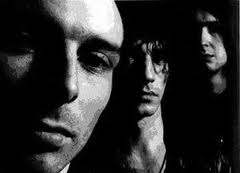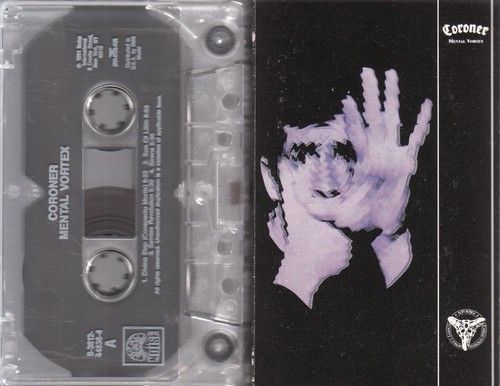
Therapists all over the world, when hey throw up the word “underrated” in their word association tests — which they surely do, right? — the top response must certainly be “Coroner.” And then the patient wipes away a single tear to move stoically onto the next word, though he or she is broken inside. Which is why they are there in the first place. But I digress.
Holy shit, do I love me some Coroner. “Underrated” is too mild a word. That they did not continue past Grin is a crime against humanity. Though we can be thankful that they reunited for fest tours and whatnot, felt out the environs, and have moved on to the “new album” phase. It was announced quite some time ago, but as of April of this year, they’ve assured us via social media (written in stone) that this year’s the year of recording. Which is about as close to “good news” as we’re going to get here in 2020, the Year That Isn’t.

And yes, it’s minus Marky Edelmann, but everyone seems to be at peace with that, most of all him, so we can accept that. In addition to drumming, though, he was not only the graphic mastermind behind the band, he was the lyrical composer. In 1993, Joe Mackett of Riff Raff commented on the absence of “lyrical sexism,” to which Edelmann replied:
We hated the cliched things. We tried to go a different way, even in the covers. I don’t like just telling a story. It leaves it more open for the listener.
In 2012, when asked about his lyrical approach, he had this to say:
It was a simplicity I was looking for. English is not my mother tongue. It was odd for me to try to find the right words. I wanted to express in few words what I wanted to say. At the beginning, you have a book, at the end, twenty words: that’s actually what I was trying to do.
For someone who likes to write stories based on other peoples’ songs (heh…) this is just perfect. It’s true, Coroner’s lyrics, while entirely sufficient on their own and for their purposes, absolutely leaves things open for the listener, and the writer. And it’s safe to say that Coroner’s lyrics frequently read — and this is a positive in my book — as they they may not have been written by a native English speaker. That’s not to say they are “incorrect,” as that’s not the case. But it is to say that Edelmann’s use of the English language is quirky in a way that, to the English-speaking ear, sounds strange, though if you spend another 3 seconds on it, you’ll find that not having English as your primary language gives one a certain amount of creative freedom that does not come off as a bad writer abusing a thesaurus (and that is always refreshing).
Take “Divine Step,” from Mental Vortex, for instance:
This is the last hit
Your heart will beat
Into this world…This is the first step
Your soul will take
Up to the sky…No time to pray ‘cos you
Can’t stay where words
Like that would count…Face the moment
That you feared and
Glide outside your brain…
This is the last hit your heart will beat into this world. This is the first step your soul will take up to the sky. No time to pray ‘cos you can’t stay where words like that would count. Face the moment that you feared and glide outside your brain.
Just in terms of assonance and consonance, there’s a lot going on there, inside a single line, but also bleeding from one into the next, or skipping — you have to take the block as a whole prior to the chorus. Also, each line ends, not with a rhyme, which would be the obvious thing to do, but with words that act as a kind of sonic punctuation, either sharp (sky & count), or blunt (world & brain) — and I’ll venture to say that Ron Broder’s delivery accentuates this point. Then, there are the words associated with actions of the heart — hit and beat. Both are synonymous verbs for a violent act, which makes this (the very moment of death, no matter the cause) seem violent in and of itself. “Hit” is rarely, if ever, used in association with a heartbeat, and here the use is jarring and new, thus intriguing. The “beat” refers to the heartbeat, but is used as a verb. “Into this world” gives it an agency which, under the circumstances, is a little disconcerting. And juxtaposing the idea of facing a moment of fear (that sounds stressful) with simply gliding outside one’s brain (that actually sounds relaxing). Well, you know when one has resorted the using “juxtapose” in the critique, the critique has worn out its welcome, though I could add more here.

And all of this follows through the rest of the song, and although I’m fascinated by it, I know that, in terms of writing a story to “Divine Step,” these linguistic tricks are harder to sustain in 1) a longer work of prose (without becoming too poetic), and 2) to really capture the resonance of the song itself. It’s just harder, if not impossible, to work out. I can use a few turns of phrase, to draw a line from song to story, so it will largely be between me and myself. I know this is a niche thing I’m doing.
So, why “Divine Step,” then? Two reasons: First, it’s the moment of death. The entire song is basically a six-and-a-half minute cliffhanger. And you’re left hanging. You will find out if your heaven is colored black and you will find out if your suffering will find an end…but not here, not anywhere in this song (the tunnel footage in this video is obviously a draw on the well-established tunnel-and-bright-light metaphor for the near-death experience or the straight-up afterlife, but as you are about to emerge, it simply goes bright and you have no idea what’s on the other end). I like the open-mindedness of it (death is the classic, eternal cliffhanger), but also that, ultimately, it is literally a six-and-a-half minute song about a moment in time, perhaps only a second or two, between life/what you know, and death/what you don’t know (and thus fear).
What takes place in that instant? What is the thought? Is there one? And as the song goes, what is sin? And who is God?
Second, the musical structure of the song. I didn’t think too much about the structure of Carcass’s “Heartwork” for Dark Foul Light. There was a lot to work with linguistically so that’s where I gravitated. Though I’m (obviously — I am a huge nerd) taken with the lyrical content here, though for different reasons, the real draw here is how the song unfolds musically.
I am not a musician, so time signatures are like math to me — I’m not going to sit here and discuss it without my lawyer (that’s how bad my math is). But, obviously — being the Rush fans Vetterli and Broder were, there’s some wacky stuff going on here (it’s Coroner, this is not unusual). Odd signatures aside, I’m drawn to the varying speeds throughout — galloping and fast, like stream of consciousness, then circular, and then it slows and becomes dreamlike, only to gear back up to another gallop, and so on…
That’s attractive to a writer. How to use language, story, sentence structure and length (paragraphs as well) to impart the sensation of fast or slow, straight or curved. Well, I imagine it’s a lot like the way you do with with music, only the instruments are different. So, that’s my challenge here and why this song out of so (so) many brilliant Coroner songs to choose from. This is a band I’ll likely return to in the future for story mining — they’re just so, so good.
To finish up here, I’ll say this about Coroner — I don’t care when the new album comes out, as long as it eventually does. And I am entirely open to the band’s new sound/content/incarnation, because they have always been underrated. They’d been gone for so long, and they were such a tremendous band, frankly, that the world gets anything new from Coroner, at this point — we’re just lucky, and we should be open to whatever it is they want to give us at this stage in their trajectory. And the fact is, as far as I’m concerned, if it doesn’t push all of my buttons (because we all have our own subjective pleasure buttons — I hope they name the album that: Subjective Pleasure Buttons. Coroner, that’s free for you to use), I doubt my enthusiasm could be dampened. I just love that they’re back, they exist as an entity, and as individuals, they’ve decided to take this on, move forward, and see what happens.
I look forward to mining the new album, whenever it comes out, for story fixin’s.